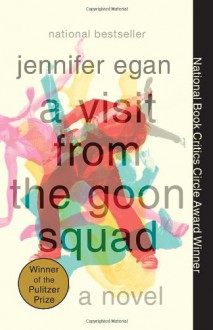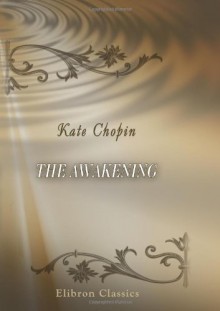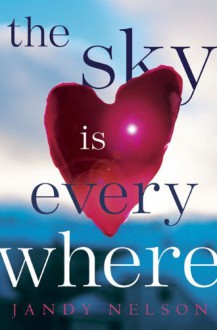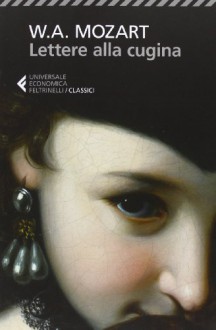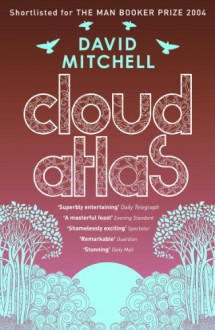I started months ago a sort of personal challenge with 3-months thematich pats. The first has been the one on musicians: reading books about musicians or in which at least one of the character plays an instrument or sing, in other words, fiction and non-fiction related in some way to people doing music.
The first candidate has been A visit from the goon squad by Jennifer Egan. Bennie Salazar, one of the many characters of the book, is inserted in music industry, although he's not enjoying it so much when we meet him, showing a very nostalgic attitude towards the past musical tendecies in his youth, when, in addition, he had a band too. Relating to this book was like going in a seesaw: my emotional disposition has changed among light indifference, sudden love, diplomatic or, sometimes, hearty and trustful friendship and surprisingly light indifference again. This has to do with the structure: changing setting, time and character too in every story of the mosaic. My disorganic appreciation depends very much on it: some "short stories" were really great (like "Safari", or "Goodbye, My Love", "Great Rock and Roll Pauses"), others have not fascinated me ("Pure Language" for example).
I liked very much how Egan has proposed the idea of time in her character's lives, particulary in how we change during our time and how often this changes imply decisions that the old-self would have denigrated, those tiny compromises sowed in our life which carry us to our actual person and situation.
I'm eager to read other books by her, she surely has talent.
Then I've read two books about Mozart's life: Mozart's Sister by Rita Charbonnier and a collection of Letters to her cousin. He's surely a character, I mean..
"Wouldn't you like to visit Herr Gold-smith again?—but what for?—what?—nothing!—just to inquire, I guess, about the Spuni Cuni fait, nothing else, nothing else?—well, well, all right. Long live all those who, who—who—who—how does it go on?—I now wish you a good night, shit in your bed with all your might, sleep with peace on your mind, and try to kiss your own behind; I now go off to never-never land and sleep as much as I can stand. Tomorrow we'll speak freak sensubly with each other. Things I must you tell a lot of, believe it you hardly can, but hear tomorrow it already will you, be well in the meantime. Oh my ass burns like fire! what on earth is the meaning of this!—maybe muck wants to come out? yes, yes, muck, I know you, see you, taste you—and—what's this—is it possible? Ye Gods!—Oh ear of mine, are you deceiving me?—No, it's true—what a long and melancholic sound!—today is the write I fifth this letter. Yesterday I talked with the stern Frau Churfustin, and tomorrow, on the 6th, I will give a performance in her chambers, as the Furstin-Chur said to me herself. Now for something real sensuble!" (One of the Letters)
A prankster! Who would suspect it, if not informed.. Even Charbonnier's novel about her sister paints him like a sort of divinally gifted libertine, who messes up several lives without care. Her sister's life, for example, because she's not a fictional character at all, she really existed. Nannerl Mozart had musical ambitions during yer youth, but fatally she had the misfortune of being obscured by a celebrated genius and a father totally engaged in building his fame. So, this is the story of a slow and progressive surrender to a dream, with much pain, silent endurance and jealousy stirred with brotherly love.
The book is good, except for some rushed executions in the psychological developments of the second part.
Then I've read The Awakening by Kate Chopin, in which a secondary character is a pianist. It's a fascinating book, particulary for the main character, Edna. She has an evocative, sinous beauty, but what she do for being so fascinating is the same amount of actions which can't be shared at all for me. She's extremely free and indipendent from any tie, cruel exactly for this reason. She fascinates and distances at the same time: I would never accept a person like Edna in my life. So I understand her, but I don't approve her actions. It's a great book anyway, maybe it's great precisely for all these reasons together.
In my mission (opening myself to YA) I've inserted The Sky is Everywhere too. Lennie is a misfortuned teenager who discover herselves through love and music (he plays clarinet) in a new intimate birth after the grief for her older sister, Baley. It was not bad at all, moving, particulary for Lennie's grief, although Lennie's life seems to rotate only on her sentimental interests, even with male characters who seem to burst out from those hughe cakes like the one of Singin in the Rain, given the idyllic profiles.
Then I came back to a loved author, Ian McEwan, with Amsterdam. Less than the the other two I read by him, Sweet Tooth and Atonement. At the centre of the story there is a sort of face-off between Vernon, a journalist; and Clive, a narcisissist composer, through the death of Molly Lane, who has been close to them, and a scoop about Julian, a famous politician. More cinic, ironically colder, less focused on feelings than Atonement for example, but also duller, less powerful than the other two generally, who were truly loose cannons in this sense. Not bad, I'd say, but it has not gained from me the same enthusiastic partecipation, only a tepid appreciation.
In comparison with Cloud Atlas, Amsterdam is a remarkable experience.
I didn't even finished it, I've tried hard, but really: at 150 pages to the end I said no, I've had enough. I understood that I was wasting my time. Extremely boring at the first story, then a little better but unsustainable in the long term. Totally uninteresting for me and I don't find the structure so brilliant, the technique of cross references was badly used.
I've read it because of this pianist in one of the stories, Luise, but he wasn't really worth the dramatic endurance.
A dramatic but worthwile book is The Loser. Simply dramatic? Depressing, oppressive, gloomy. And I believe that! What atmosphere do you expect from a depressed loser? In fact the book shows again a confrontation among three musicians, but Glenn Gould - the classic genius - is destined to win without effort. The effort, if need be, is the one of the other two: the main voice will leave music world to undertake a career as a poor intellectual (philosopher) and Wertheimer, the real protagonist, is the looser. Gould will instill in him a feeling of inferiority which will degenerate in a destructive obsession for the rest of his life. It's disturbing for the whole range of the typical feelings and behaviors of a loser: shameful, inglorious I'd say but pitful. Full of self-compassion and clumsiness. One of the most undesiderable state of mind for a man, I think.
Bernhard really knows how to describe this kind of man, but really, he's really burdensome to follow. I'll probably read other books by him.
And the last but not least: Bel Canto. An enjoyable read! I didn't expect a fully accurate historical book, like others did, but only a possibly good book of fiction. In fact if we pause on this aspect, critics would prosper. It's fictionalized, essentialy optimistic, surprisingly against the tide of a dystopian degeneration (in situations like these). So optimistic in this sense as becoming utopian (a cohabitation among fifty individuals can't be so tender). But it's clear that the entire book is an ode to love (and the ennobling power of music through one of the main characters, who is a opera singer), and I've appreciated its way of doing it.
I perceived it as an emotional story.
The ending was totally improper though.
Taking stock, the most appreciated are the last two and also Chopin's book and parts of Egan's one. The subject of musicians seems to trace a common idea of music as intimate discovery of oneself, in which a dejected heart (and soul) can revive, not simply console itself. A beautiful concept.
But music world, for example, can be seen also as an umerciful battlefield full of harsh competitions, like in Amsterdam, Mozart's Sister and The Looser. Often the main characters seems destined to succumb or otherwise loose an ethical code in the way.
But I'd say that this belongs to many sectors, not only creative but also financial, economic, and so on. So it's not particulary surprising. :P
It has been absolutely interesting! I'd like to see Amadeus by Milos Forman and I have to the VHS here at home, so I'll do it sooner or later, given that I love cinema. :)
What will come next in this section of thematic paths? ....Who knows..;)

 Log in with Facebook
Log in with Facebook 
